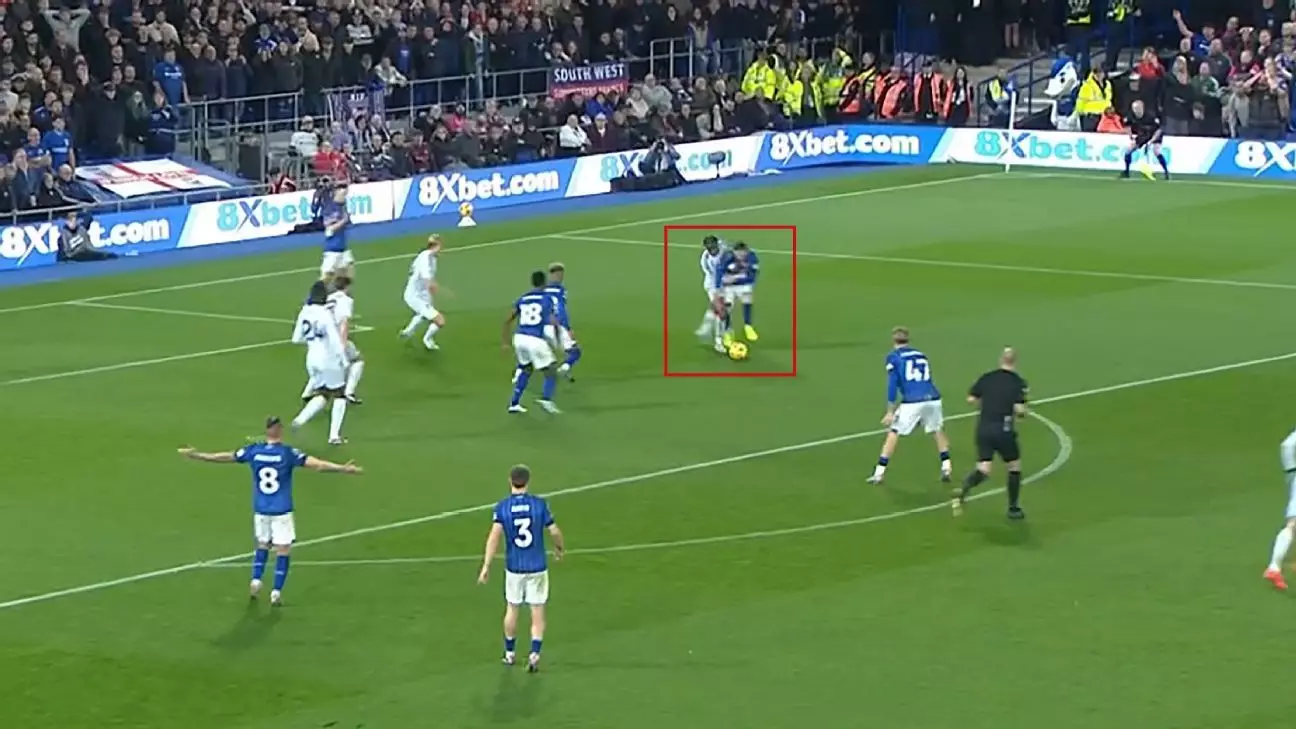In a passionate display of frustration, Ipswich Town chairman Mark Ashton has raised urgent concerns surrounding the Video Assistant Referee (VAR) system after his club faced what he termed a “real injustice” during a recent match against Leicester City. The incident in question occurred when Ipswich, leading 1-0, faced a critical moment late in the game. A foul on Ipswich player Conor Chaplin by Leicester’s Fatawu Issahaku inside the penalty area went unpunished by the referee, Tim Robinson, and not even the VAR intervened.
Ashton’s comments reflect a growing unrest within football circles regarding VAR’s efficacy and its impact on match outcomes. Not only did Ipswich ultimately draw the match 1-1, but they also left the pitch feeling wronged by what they believe to be inconsistent officiating. This sentiment echoes a broader dissatisfaction that many clubs, particularly those outside the traditional football elite, have expressed. The insistence on a fair review of incidents is central to the ongoing debate about whether VAR is serving its intended purpose.
Ashton’s personal investment in Ipswich Town is evident. He has stated that he will do everything within his power to defend the club’s interests. His resolve is particularly poignant given his communication with Howard Webb, the chief of refereeing for the PGMOL (Professional Game Match Officials Limited), prior to the match. Ashton felt a sense of impending injustice, leading him to reach out to Webb, suggesting a proactive approach to address grievances that seem to plague the club.
This candid communication highlights a crucial point: the emotional toll that automated systems like VAR can take on clubs, fans, and officials alike. In his conversation with Webb, Ashton clearly articulated his frustrations while also implicitly calling for accountability within the VAR system. The chairman’s willingness to engage openly demonstrates the challenges faced by clubs striving for fair treatment and transparency.
The controversy surrounding the use of VAR in this match is far from isolated. Ipswich has experienced a troubling trend, registering three VAR decisions that adversely affected them this season—two penalties awarded against them and a canceled penalty earlier this season. Ashton’s declarations suggest that the perceived lack of equity in VAR decisions raises significant concerns about consistency and accuracy within the system.
He emphasized the need for clear communication regarding VAR protocols, highlighting the contradiction of having a penalty awarded at one end of the pitch while a similar infraction is overlooked at the other. For clubs like Ipswich, it is not merely about winning games; it is about upholding the integrity of the sport itself. The apparent disconnect between refereeing decisions and what viewers recognize as clear fouls showcases the ongoing crisis of confidence in the VAR system.
Ashton’s commitment to understanding the reasons behind VAR’s shortcomings is laudable. He noted the impending meeting at Portman Road—a step towards fostering dialogue and hopefully illuminating the perplexities that haunt the officiating process. This approach not only seeks to keep Ipswich stakeholders informed but also reassures fans that their voices matter in the larger conversation surrounding core policies in football.
Furthermore, the dialogue extends beyond isolated incidents; Ashton subtly hints at a broader conversation involving potential biases in officiating. While he refrains from directly accusing referees of favoritism towards larger clubs, the implications of his statements suggest a shared sentiment among smaller clubs that they face an uphill battle against an entrenched system that may not always prioritize fairness.
Ultimately, Ashton’s remarks bring forth a vital discussion about the future of VAR. Ipswich, still grappling with the fallout from their recent controversies, finds itself at the crossroads of tradition and modern technology in the sport. As the chairman expressed, he would reconsider his initial support of VAR based on its current trajectory.
This ongoing discourse represents an essential examination of how clubs at all levels engage with systems purportedly designed to enhance the fairness of the game. It is evident that the dialogue surrounding VAR is far from resolved, indicating a necessity for ongoing engagement among clubs, officials, and governing bodies. The need for meaningful reform and clearer guidelines remains urgent, ensuring that the beautiful game retains its authenticity while evolving alongside technological advancements.
Ipswich Town’s chairman Mark Ashton mirrors the frustrations of many who seek improved fairness and transparency in the application of VAR. A cohesive understanding among all stakeholders is vital for fostering trust in officiating—and ultimately, for the future of football itself.

